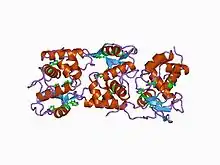Glycoside hydrolase family 24
In molecular biology, glycoside hydrolase family 24 is a family of glycoside hydrolases.
| Phage lysozyme | |||||||||
|---|---|---|---|---|---|---|---|---|---|
 lysozyme from bacteriophage lambda | |||||||||
| Identifiers | |||||||||
| Symbol | Phage_lysozyme | ||||||||
| Pfam | PF00959 | ||||||||
| Pfam clan | CL0037 | ||||||||
| InterPro | IPR002196 | ||||||||
| SCOP2 | 119l / SCOPe / SUPFAM | ||||||||
| CAZy | GH24 | ||||||||
| CDD | cd00442 | ||||||||
| |||||||||
Glycoside hydrolases EC 3.2.1. are a widespread group of enzymes that hydrolyse the glycosidic bond between two or more carbohydrates, or between a carbohydrate and a non-carbohydrate moiety. A classification system for glycoside hydrolases, based on sequence similarity, has led to the definition of >100 different families.[1][2][3] This classification is available on the CAZy web site,[4][5] and also discussed at CAZypedia, an online encyclopedia of carbohydrate active enzymes.[6][7]
Glycoside hydrolase family 24 CAZY GH_24 comprises enzymes with only one known activity; lysozyme (EC 3.2.1.17). This family includes lambda phage lysozyme and Escherichia coli T4 phage endolysin.[8] Lysozyme helps to release mature phage particles from the cell wall by breaking down the peptidoglycan. The enzyme hydrolyses the 1,4-beta linkages between N-acetyl-D-glucosamine and N-acetylmuramic acid in peptidoglycan heteropolymers of prokaryotic cell walls. E. coli endolysin also functions in bacterial cell lysis and acts as a transglycosylase. The T4 lysozyme structure contains 2 domains, the interface between which forms the active-site cleft. The N-terminus of the 2 domains undergoes a 'hinge-bending' motion about an axis passing through the molecular waist.[8][9] This mobility is thought to be important in allowing access of substrates to the enzyme active site.
References
- Henrissat B, Callebaut I, Fabrega S, Lehn P, Mornon JP, Davies G (July 1995). "Conserved catalytic machinery and the prediction of a common fold for several families of glycosyl hydrolases". Proceedings of the National Academy of Sciences of the United States of America. 92 (15): 7090–4. Bibcode:1995PNAS...92.7090H. doi:10.1073/pnas.92.15.7090. PMC 41477. PMID 7624375.
- Davies G, Henrissat B (September 1995). "Structures and mechanisms of glycosyl hydrolases". Structure. 3 (9): 853–9. doi:10.1016/S0969-2126(01)00220-9. PMID 8535779.
- Henrissat B, Bairoch A (June 1996). "Updating the sequence-based classification of glycosyl hydrolases". The Biochemical Journal. 316 (Pt 2): 695–6. doi:10.1042/bj3160695. PMC 1217404. PMID 8687420.
- "Home". CAZy.org. Retrieved 2018-03-06.
- Lombard V, Golaconda Ramulu H, Drula E, Coutinho PM, Henrissat B (January 2014). "The carbohydrate-active enzymes database (CAZy) in 2013". Nucleic Acids Research. 42 (Database issue): D490-5. doi:10.1093/nar/gkt1178. PMC 3965031. PMID 24270786.
- "Glycoside Hydrolase Family 24". CAZypedia.org. Retrieved 2018-03-06.
- CAZypedia Consortium (December 2018). "Ten years of CAZypedia: a living encyclopedia of carbohydrate-active enzymes" (PDF). Glycobiology. 28 (1): 3–8. doi:10.1093/glycob/cwx089. PMID 29040563.
- Weaver LH, Matthews BW (January 1987). "Structure of bacteriophage T4 lysozyme refined at 1.7 A resolution". Journal of Molecular Biology. 193 (1): 189–99. doi:10.1016/0022-2836(87)90636-X. PMID 3586019.
- Faber HR, Matthews BW (November 1990). "A mutant T4 lysozyme displays five different crystal conformations". Nature. 348 (6298): 263–6. Bibcode:1990Natur.348..263F. doi:10.1038/348263a0. PMID 2234094. S2CID 4266149.